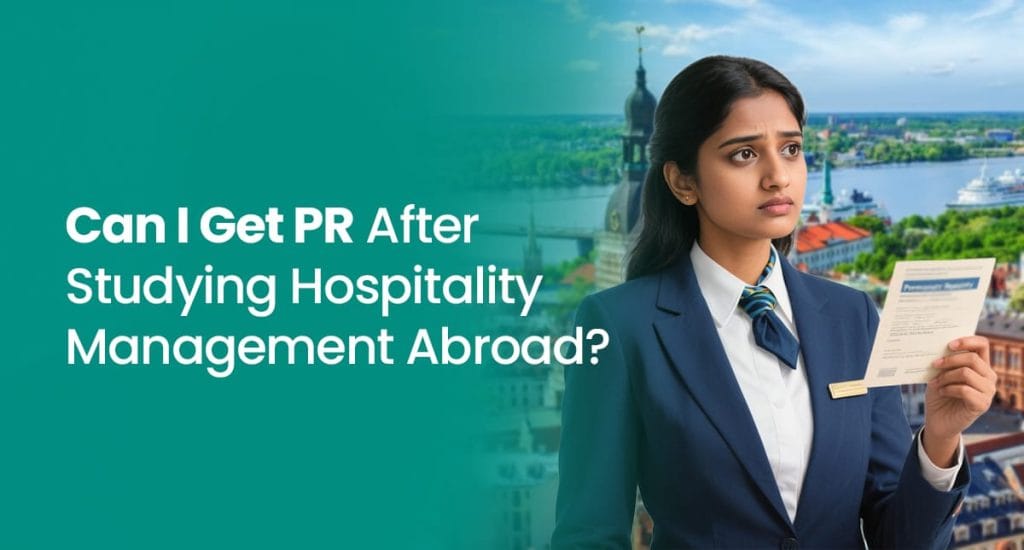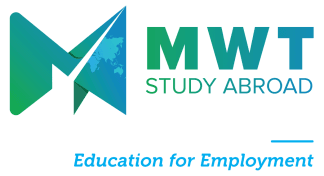Blog

Can I Get PR After Studying Hospitality Management Abroad?
Yes, you can easily get a permanent residency (PR) after studying hospitality management abroad, but you need to understand the key requirements first. From aromatic culinary arts to vibrant event planning, a wide range of exciting programmes await you overseas.
You’ll become eligible for PR after completing your hospitality management studies abroad, provided you meet the necessary eligibility criteria.
Let’s dive into the details and explore how you can achieve permanent residency upon successful course completion and relevant work experience.
Why is Hospitality Management Becoming Popular?
The global hospitality industry has opened up a world of opportunities for skilled professionals due to skill shortages across the sector. In many countries, this demand has grown significantly, especially in areas such as hotel management, restaurant operations, and event services. Countries such as Canada, the United Kingdom, and New Zealand have all reported a growing demand for hospitality professionals, with strong PR pathways for skilled graduates.
The hospitality pathway to PR typically includes a recognised hospitality qualification combined with relevant work experience. To make the most of this route, you must thoughtfully align your course selection and employment journey with overseas immigration planning.
Hospitality Management PR Pathway: The Process
If you are wondering how the path to permanent residence will turn out, here is a breakdown of all the stages involved.
Course selection: International students need to finalise a course that matches their interests and future scope. For example, courses such as food and beverage operations and cafe businesses are deemed of high interest due to their rising popularity.
Graduate and obtain post-study work rights: The second important step is to be aware of the graduate post-study work rights in the target country.
Work experience in the hospitality sector: A graduate with work experience and one without the same are viewed differently because work experience undoubtedly strengthens PR applications. There are a wide variety of ways for aspirants to secure employment, either through employer sponsorships or skilled migration pathways.
Apply for permanent residence: An international aspirant should submit their PR application under recognised immigration frameworks such as employer nomination or labour agreement for all kinds of hospitality management roles, including cafe managers, chefs and hoteliers.
Note: Studying hospitality abroad requires aspirants to take note of these important exemptions. According to labour agreements in hospitality, the document allows workers aged up to 55 years to work for particular occupations like motel manager, accommodation manager, and so on and so forth.
Moreover, the temporary graduate visa has an age limit of 35 years as per the latest records. Despite these pointers, students can always study and work abroad with a global exposure.
What to Consider Before Enrolling in Hospitality Courses Leading to PR
Here are a few key considerations before finalising your pathway to PR:
Course recognition & relevance: Ensure your chosen course is formally recognised across countries and aligns with global hospitality occupations eligible for PR. Also, make sure the curriculum provides strong practical training to make you industry-ready.
Occupation in demand: Research your target country to confirm skill shortages in the hospitality sector. Refer to official occupation lists and labour market insights. Review labour agreements that highlight suitable hospitality roles for migration pathways.
Work experience: The journey between temporary stay and PR depends on the depth of work experience obtained. Build strong professional networks during internships with both regional and international firms, as these relationships often lead to sponsorship opportunities.
Regional vs metropolitan: In some countries, working in regional areas can offer additional benefits for PR applicants. International aspirants can take advantage of such options to improve their chances of permanent residency.
Final Thoughts: Is It the Right Move for You?
In a nutshell, securing PR after studying hospitality management abroad is achievable with a well-planned approach. Choose a suitable course, prioritise practical training, gain relevant work experience, and make decisions aligned with your long-term goals.
Additionally, research destination countries carefully, keep track of immigration policy updates communicated via official channels, and continue enhancing both hard and soft skills through real-world experience and certifications.
For a guided approach, consider getting in touch with a strategic study abroad expert like MWT Study Abroad early in your planning stage to streamline your journey from your home country to a global hospitality career.





